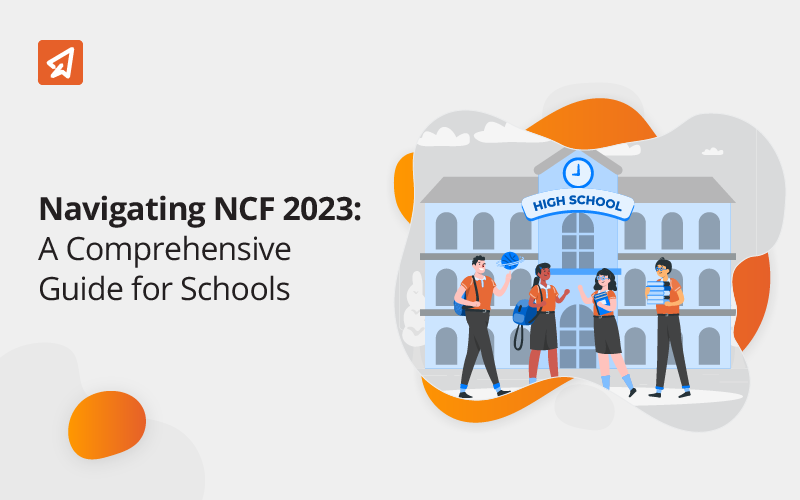Navigating NCF 2023: A Comprehensive Guide for Schools

The Indian education system stands at the cusp of yet another transformative phase. The National Council for Education, Research and Training (NCERT) has taken a groundbreaking step with the release of a revised version of the National Curriculum Framework (NCF), known as the National Curriculum Framework for School Education (NCFSE) 2023. This revolutionary framework acts as an essential guideline for educators, school administrators and policymakers, serving as a roadmap for the development of curriculum and pedagogy.
Today, we take a deeper look at how NCF 2023 is redefining the Indian educational landscape by evaluating key highlights from our webinar on ‘Designing for Excellence: NCF’s Vision for Future Curriculum & Syllabus’. This episode of Extramarks Elevate, a thought leadership series on education and technology, brings together pioneers from the field of education to share their expertise on the implementation of NCF 2023 and its anticipated impact on revolutionizing India’s educational future. Let’s begin by reviewing our esteemed panel of education experts!
1. Dr. Anup K. Rajput, Head of Publication Division, NCERT
2. Mr. Yash Saxena, Principal, The Rajkumar College, Rajkot
3. Ms. Rita Singh, Group Director, Indirapuram Group of Schools
4. Ms. Dimple Puri, Arwachin International School, Delhi
5. Ms. Poonam Singh Jamwal, Director, Extramarks Education
During the webinar, these experts gave us insights into their vision of a comprehensive and holistic learning environment. They expressed their views of the evolving educational landscape and how the inception of NCF 2023 fosters academic changes that transcends conventional boundaries. The conversation revolved around the importance of nurturing self-directed learners and equipping them with 21st-century skills to thrive in an ever-changing modern world.
Key Takeaways
To help you understand the conversation better, here are key highlights from the webinar that can prove beneficial for teachers, students, school administrators and education enthusiasts:
1. Strategic Direction of Education
The panelists discuss the crucial role of education in driving societal change and emphasize the need for maintaining a strategic direction. They talk about how NEP 2020 underscores a shift from knowledge-centric learning to competency development by instilling the required skills, attitudes and values in learners. It is essential for schools to foster a strategic direction when it comes to educational practices, as it becomes a potent agent for positive societal change.
2. Respect & Dignity in Learning Environments
A holistic learning environment is rooted in respect and dignity. The speakers discuss how implementing NCF’s vision involves developing clarity in goals, setting defined benchmarks to keep progress in check and leveraging the right digital technology to ensure that students become self-directed learners.
3. Balancing Life Skills & Academic Targets
The webinar addresses the need for striking the right balance when it comes to academic performance and building life skills. Our panelists share their opinions on the different ways in which educators should be trained to nurture active learners with well-rounded personalities. Besides life skills, they also emphasize on fostering value education and building global awareness among learners in a secure and inclusive environment.
4. Focus on Personalized Learning Journeys
The panelists discuss how it is time to steer away from conventional assessment methods and move towards practices that are more holistic. They propose a focus on individual learning journeys, wherein progress is measured by comparing students’ current performance to their past performances and generating insights based on their learning journey. This form of assessment is also known as ipsative assessment and the panelists share their take on its effectiveness in terms of offering tailored support to students, promoting adaptability and developing a holistic academic journey.
5. Adapting to Digital Learning Preferences
Through the webinar, we learn about the importance of cultivating student-centric curriculums and pedagogies. NCF 2023 focuses on initiating a flexible curriculum that fosters self-directed learning. Our experts share their take on integrating technology and digital tools in education to cater to the new-age students’ learning preferences. The idea is to align educational practices with evolving student needs, according to the expert’s views.
You can access the webinar recording here:
For a more detailed understanding of this visionary framework, we have put together a comprehensive guide on NCF 2023, outlining its objectives and implementation strategies. This guide will help you understand NCF’s promising vision for the future of education and how educational institutions can prepare for this transformative change!
NCF’s Vision Unveiled: An Exploration of NCF’s Visionary Blueprint for Future Curriculum and Syllabus
The NCF has undergone several iterations since its inception in 1986 and has effectively adapted to technological advancements and transforming trends in the field of education. The latest edition of NCF aligns seamlessly with National Education Policy (NEP) 2020’s overarching vision by embracing an inclusive and learner-centric approach to education.
Based on the latest iterations, NCF 2023 introduces several changes within existing pedagogical structures, language studies, assessment methods and board examination schedules, among others. It caters to foundational, preparatory, middle and secondary learning stages, spanning across the complete spectrum of India’s school education.
Here is a comprehensive look at the key objectives of NCF 2023:
1. Aiming for holistic development
NCF 2023 highlights the need to cultivate an inclusive learning environment by practicing a holistic approach to education. The goal is to develop well-rounded learners by focusing on physical, social, emotional and cognitive growth.
2. Development of pedagogy
It aligns with NEP 2020’s vision of the 5+3+3+4 pedagogical approach that is strategically designed to aid value-based learning. The new NFC aims to implement a shift from rote memorization to conceptual learning and skill development in order to prepare students to tackle 21st century challenges effectively.
3. Effective assessment practices
The framework promotes formative assessments, where learners get the opportunity to demonstrate their understanding in meaningful and contextually relevant ways. The idea is to recognize the limitations of standardized testing and implement evaluation practices that promote authentic learning.
4. Improved teacher training & development
NCF 2023 attempts to create multiple teacher training programs for educators to help them gain the required knowledge, abilities and skill sets to create an equitable learning environment with a keen focus on holistic development.
Watch our video on how the National Curriculum Framework (NCF) supports teachers in transforming education.
21st-Century Skills Integration: How Schools Adapt to NCF’s Directive of Infusing Modern Skills into the Curriculum
The NCF 2023 outlines the importance of experiential learning and champions competency-based education. It focuses on building competencies beyond the textbook by cultivating skills such as critical thinking, communication, creativity, collaboration and problem-solving. On a curricular level, the framework advocates a more flexible curriculum that is learner-centered and relevant to the needs of the 21st century. It gives students the option to choose subjects based on individual interest.
Schools integrate these changes by aligning with NEP 2020 and NCF 2023’s overarching vision of infusing interdisciplinary and skill-based learning. For example, students from class 11 & 12 will have access to a varied range of choice-based courses where they can pick from 16 courses segregated under 8 curricular areas. These subjects range from Languages, Arts and Science to Vocational Education, Physical Education, Crafts and Climate Education. This varied selection of dynamic subjects will equip students with real-life skills needed to navigate the complexities of the modern-day world.
Implementing NCF 2023: Hands-on Strategies for Schools to Integrate the Framework

NCF 2023’s core emphasis lies in cultivating a holistic learning environment. Based on the latest iterations, students have more flexibility in the choice of subjects they study and greater opportunities to build critical thinking and problem-solving skills. NCF 2023 also champions teachers and school administrators by providing a user-friendly curriculum that is infused with innovative teaching approaches.
Today, we explore how NCF 2023 intends to introduce this curricular transformation and the role of schools and educators in bringing this vision to life, through these 4 fundamental principles:
1. Holistic Development: Fostering a Multidimensional Approach to Education
The NCF advocates an all-encompassing approach to learning that goes beyond academics. It emphasizes the need for cultivating cognitive skills as also physical, social and emotional development to nurture well-rounded individuals. Teachers are encouraged to adopt a multidimensional approach that caters to diverse student needs and promotes overall growth.
2. Inclusivity: Granting Educational Access to All
It aims to create an education system that embraces all learners, including those from marginalized backgrounds. Teachers should establish a bias-free learning environment where students feel valued and can learn about diverse cultural perspectives.
3. Competency-Based Education: Focusing on Practical Skills Over Rote Learning
NCF 2023 focuses on nurturing critical thinking, problem-solving and communication skills through skill-based learning. Teachers are encouraged to design lessons that encourage active participation, collaboration and real-world applications. This will prepare students for practical challenges beyond the academic setting.
4. Integration of Technology: Cultivating Tech-Savvy Learners
Technology plays a key role in modern education, which is why NCF 2023 accounts for its seamless integration. It recommends using digital resources to enrich teaching and learning. Additionally, the framework highlights the role of technology in assessments and evaluations, fostering innovative methods to measure student progress.
Watch our video to see how the National Curriculum Framework enhances education for all.
Overcoming Implementation Hurdles: Strategies for Addressing Real-World Challenges When Implementing NCF’s Vision
NCF 2023 has been designed to address the key challenges within the existing Indian education system. It advocates a shift towards experiential and multidisciplinary learning to prepare students with a holistic understanding of various subjects. We have outlined 3 key strategies to help schools overcome real-world challenges while implementing this visionary framework:
1. Teacher training initiatives: A robust learning environment requires well-trained and competent teachers. Launch teacher training programs to equip teachers with the necessary skills based on NCF 2023’s vision.
2. Technology integration & resource allocation: Ensure that your school has access to the latest digital technology and education resources to facilitate a curriculum that is aligned with NCF 2023’s key objectives.
3. Continuous evaluation: Establish a solid feedback loop to monitor progress. Regular assessment and adaptation of strategies will help develop a flexible approach in addressing challenges, fostering the effective implementation of NCF’s vision.
Thus, the NCF 2023 encourages educational institutions to understand its key objectives and embody these core principles in order to lay a solid foundation for a progressive and inclusive learning environment.
If you’re on the lookout for a comprehensive digital solution that caters to new-age learners, check out Extramarks Smart Class Plus – a dynamic 360-degree teaching-learning solution that features NEP-ready learning content, game-based learning modules, powerful assessment tools and lots more. Explore the power of plus today!
Last Updated on February 27, 2025
Reviewed by

Prachi Singh | VP - Academics
Prachi Singh is a highly accomplished educationist with over 16 years of experience in the EdTech industry. Currently, she plays a pivotal role at Extramarks, leading content strategy and curriculum development initiatives that shape the future of education...read more.









